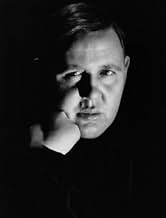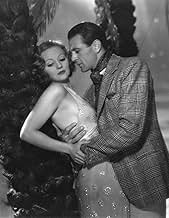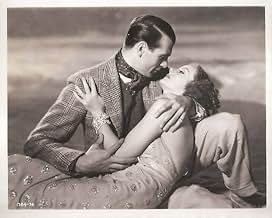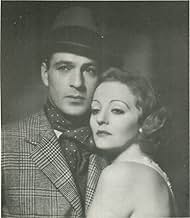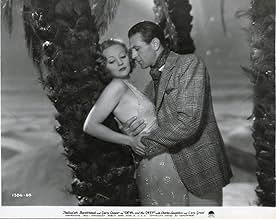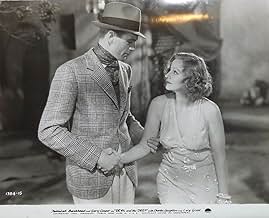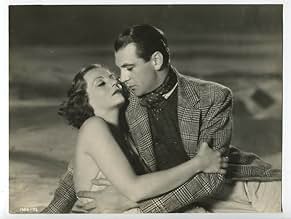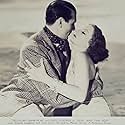A man sets out for revenge after learning of his wife's affair.A man sets out for revenge after learning of his wife's affair.A man sets out for revenge after learning of his wife's affair.
- Director
- Writers
- Stars
- Awards
- 1 win total
James Dugan
- Condover
- (as Jimmie Dugan)
Peter Brocco
- Wireless Operator
- (uncredited)
Jack Gardner
- Submarine Crewman
- (uncredited)
John George
- Man in Crowd
- (uncredited)
Henry Guttman
- Submarine Crewman
- (uncredited)
Fred Kohler Jr.
- Submarine Crewman
- (uncredited)
Anderson Lawler
- Sailor
- (uncredited)
Lucien Littlefield
- Shopkeeper
- (uncredited)
- Director
- Writers
- All cast & crew
- Production, box office & more at IMDbPro
6.3971
1
2
3
4
5
6
7
8
9
10
Featured reviews
And Starring Tallulah Bankhead
Bankhead made a handful of silent films before she became the rage of the London stage in the late 20s. Back in Hollywood, she made 7 films in 1931 and 1932. The Devil and the Deep was the penultimate one. She was not a success. It would be more than a decade before she would "face the cameras" again in 1944's brilliant Lifeboat for Alfred HItchcock.
The few of these early talkies I've seen have been fascinating because Bankhead was a STAR, and no one was quite like her. She had the allure of Garbo or Dietrich, but she was closer to Davis or Crawford or Constance Bennett in her temperament. In Faithless, Tarnished Lady, The Cheat, and Devil and the Deep she plays basically the same character: the woman who goes wrong but is saved in the end. Bankhead suffered in her 30s films from lousy directors. In Devil and the Deep, Marion Gering mis-directs by letting Charles Laughton ham it up as the husband, while Gary Cooper as the lover is boring. Bankhead holds center stage and is really very good in this VERY strange film.
It's a submarine movie set apparently in Algiers or some such place. She is the commander's bored wife. He's nuts. After her fling with Cary Grant (yes it's quite the cast), Laughton has him transferred. Cooper's fate is worse since they're all aboard the sub when all hell breaks loose.
Bankhead looks great in stylish clothing and slinks about the house and the club , the streets (amid whirling dervishes), and on the sub. Laughton is menacing and his final scene is memorable. But they're not a very believable couple. Cooper is oddly boring and is given awful lines to say. Grant, in a small part, is, well, Cary Grant. Paul Porcasi is the shop keeper, Henry Kolker and Juliette Compton are the catty club denizens. One problem is that the film is underlit so it's hard to see a lot of detail. Amusing scenes with Cooper and Bankhead staring up at the stars, buying cheap perfume, and buying a pool cue.
With a better director and better writers, this could have been a blockbuster. But it's neat to see Bankhead in her prime, before she became a campy professional star.
The few of these early talkies I've seen have been fascinating because Bankhead was a STAR, and no one was quite like her. She had the allure of Garbo or Dietrich, but she was closer to Davis or Crawford or Constance Bennett in her temperament. In Faithless, Tarnished Lady, The Cheat, and Devil and the Deep she plays basically the same character: the woman who goes wrong but is saved in the end. Bankhead suffered in her 30s films from lousy directors. In Devil and the Deep, Marion Gering mis-directs by letting Charles Laughton ham it up as the husband, while Gary Cooper as the lover is boring. Bankhead holds center stage and is really very good in this VERY strange film.
It's a submarine movie set apparently in Algiers or some such place. She is the commander's bored wife. He's nuts. After her fling with Cary Grant (yes it's quite the cast), Laughton has him transferred. Cooper's fate is worse since they're all aboard the sub when all hell breaks loose.
Bankhead looks great in stylish clothing and slinks about the house and the club , the streets (amid whirling dervishes), and on the sub. Laughton is menacing and his final scene is memorable. But they're not a very believable couple. Cooper is oddly boring and is given awful lines to say. Grant, in a small part, is, well, Cary Grant. Paul Porcasi is the shop keeper, Henry Kolker and Juliette Compton are the catty club denizens. One problem is that the film is underlit so it's hard to see a lot of detail. Amusing scenes with Cooper and Bankhead staring up at the stars, buying cheap perfume, and buying a pool cue.
With a better director and better writers, this could have been a blockbuster. But it's neat to see Bankhead in her prime, before she became a campy professional star.
Great Performances In An Incoherent Story
Devil And The Deep finds Tallulah Bankhead cast with two Hollywood icons, Gary Cooper and the up and coming Cary Grant as the wife of a submarine commander who has a fling with both guys. But the one who really steals the film in what was his American film debut with Paramount is Charles Laughton.
Although The Old Dark House was made first, Paramount held up its release for Devil And The Deep, the better to give Laughton exposure with a proved box office champion in Gary Cooper. Laughton is stunning as an insanely jealous husband.
I think a lot of Devil And The Deep may have been left on the cutting room floor. In the beginning it's made quite clear that Tallulah is a woman of easy virtue. But later on the tone of the film abruptly shifts so that your sympathies shift from Laughton to her. The story loses a lot of coherency with that.
Still the performances are great and the climax on board the submarine is very well staged. Definitely a must for a fan of any of the stars in the quartet.
Although The Old Dark House was made first, Paramount held up its release for Devil And The Deep, the better to give Laughton exposure with a proved box office champion in Gary Cooper. Laughton is stunning as an insanely jealous husband.
I think a lot of Devil And The Deep may have been left on the cutting room floor. In the beginning it's made quite clear that Tallulah is a woman of easy virtue. But later on the tone of the film abruptly shifts so that your sympathies shift from Laughton to her. The story loses a lot of coherency with that.
Still the performances are great and the climax on board the submarine is very well staged. Definitely a must for a fan of any of the stars in the quartet.
Hard to Believe This Here Isn't Better Known
Devil and the Deep (1932)
*** (out of 4)
Diana Sturm (Tallulah Bankhead) is married to submarine Cmdr. Charles Sturm (Charles Laughton) and everyone sees her as a bad person. The truth of the matter is that Charles is extremely abusive to her and will stop at nothing to destroy any man's life he feels she is attracted to. One night while running away from the abuse, Diana meets Lt. Sempter (Gary Cooper) and the two have a relationship, which soon leads to disaster.
DEVIL AND THE DEEP isn't a very well-known movie and I must admit that I'm quite shocked about that. I had never really heard of the film until recently and it's rather amazing because you've got not only Bankhead, Laughton and Cooper but you've also got a young Cary Grant in a nice early role. Four legendary stars from Hollywood's Golden Age and you mention the title to most film buffs and they won't be familiar with it.
Whatever the reason people don't know the film, it's really too bad because it's actually pretty good. The greatest thing about the film is the ending, which I won't spoil but it takes place on the submarine and there's no question that it's quite tense and rather claustrophobic. Director Marion Gering really does a nice job with this entire sequence and while some of the special effects shots aren't the greatest, the overall impact of the scene is very good. The film does get off to a rather slow start but it quickly picks up.
The performances are certainly the main reason to watch the picture with Bankhead delivering a fine one. She's very good in the role of the abusive wife and I really enjoyed her performance when she had to show the fear she feels for her husband. I thought the actress was very believable as an abused woman. Cooper was also very stoic in his "hero" type of role. I thought the two of them shared some very good chemistry and that helped their relationship. Grant appears early on in the picture and he's very good as well. As for Laughton, he gets a very special screen credit and he certainly deserves it as he is great as the crazed man who will stop at nothing to hurt his wife and any man who likes her. By watching this film it's easy to see why he would eventually be cast in MUTINY ON THE BOUNTY.
At just seventy-five minutes the film has a very good pace and there's no question that it's one worth watching.
*** (out of 4)
Diana Sturm (Tallulah Bankhead) is married to submarine Cmdr. Charles Sturm (Charles Laughton) and everyone sees her as a bad person. The truth of the matter is that Charles is extremely abusive to her and will stop at nothing to destroy any man's life he feels she is attracted to. One night while running away from the abuse, Diana meets Lt. Sempter (Gary Cooper) and the two have a relationship, which soon leads to disaster.
DEVIL AND THE DEEP isn't a very well-known movie and I must admit that I'm quite shocked about that. I had never really heard of the film until recently and it's rather amazing because you've got not only Bankhead, Laughton and Cooper but you've also got a young Cary Grant in a nice early role. Four legendary stars from Hollywood's Golden Age and you mention the title to most film buffs and they won't be familiar with it.
Whatever the reason people don't know the film, it's really too bad because it's actually pretty good. The greatest thing about the film is the ending, which I won't spoil but it takes place on the submarine and there's no question that it's quite tense and rather claustrophobic. Director Marion Gering really does a nice job with this entire sequence and while some of the special effects shots aren't the greatest, the overall impact of the scene is very good. The film does get off to a rather slow start but it quickly picks up.
The performances are certainly the main reason to watch the picture with Bankhead delivering a fine one. She's very good in the role of the abusive wife and I really enjoyed her performance when she had to show the fear she feels for her husband. I thought the actress was very believable as an abused woman. Cooper was also very stoic in his "hero" type of role. I thought the two of them shared some very good chemistry and that helped their relationship. Grant appears early on in the picture and he's very good as well. As for Laughton, he gets a very special screen credit and he certainly deserves it as he is great as the crazed man who will stop at nothing to hurt his wife and any man who likes her. By watching this film it's easy to see why he would eventually be cast in MUTINY ON THE BOUNTY.
At just seventy-five minutes the film has a very good pace and there's no question that it's one worth watching.
Tallulah Bankhead takes charge in intense melodrama
Paramount, at the height of its sophistication in the early 30's, could recycle its sets from MOROCCO and fashion a stylish production out of a passable triangle melodrama. Unfulfilled wife Tallulah Bankhead --frustrated at home, humiliated in front of her social set by her pathologically jealous husband -- stumbles into an Arab marketplace crowded with whirling dervishes, and into the arms of Gary Cooper for a romantic liaison under the desert stars. Conflicts ensue, of course, and then all three find themselves on a crippled submarine.
Viewers who know Tallulah Bankhead only from her caricatured role in LIFEBOAT will be startled by her intensity and bruised glamour: slouching in Travis Banton gowns, she looks sometimes like Garbo, sometimes like "Margo Channing". Meanwhile, she gives a crash course in how to hold a melodrama together, commanding every scene, inflecting every line with subtle nuances. When she must deal with menacing Charles Laughton, the air between them vibrates with tension. Laughton [billed as "the eminent English character actor"] does his share as well, but he seems mannered in a familiar way, a dry run for his Captain Bligh.
Only the radiant young Cary Grant in a dazzling naval uniform steals attention from the leading lady in a brief appearance. Gary Cooper, though persuasive as the romantic hero, soon gets submerged in a disappointingly shallow character.
The eye is seduced by cameraman Charles Lang's repertoire of shadows, the heart is stirred by a star performance, but in the end the head may resist: the terse dialogue tries for Hemingway but remains stubbornly pedestrian and remarkably humorless: the script owes its sole laugh to Bankhead's line reading while buying a billiard cue. The devil is in the dialogue!
Viewers who know Tallulah Bankhead only from her caricatured role in LIFEBOAT will be startled by her intensity and bruised glamour: slouching in Travis Banton gowns, she looks sometimes like Garbo, sometimes like "Margo Channing". Meanwhile, she gives a crash course in how to hold a melodrama together, commanding every scene, inflecting every line with subtle nuances. When she must deal with menacing Charles Laughton, the air between them vibrates with tension. Laughton [billed as "the eminent English character actor"] does his share as well, but he seems mannered in a familiar way, a dry run for his Captain Bligh.
Only the radiant young Cary Grant in a dazzling naval uniform steals attention from the leading lady in a brief appearance. Gary Cooper, though persuasive as the romantic hero, soon gets submerged in a disappointingly shallow character.
The eye is seduced by cameraman Charles Lang's repertoire of shadows, the heart is stirred by a star performance, but in the end the head may resist: the terse dialogue tries for Hemingway but remains stubbornly pedestrian and remarkably humorless: the script owes its sole laugh to Bankhead's line reading while buying a billiard cue. The devil is in the dialogue!
big stars and toy boats
Devil and the Deep contains a fascinating performance from Charles Laughton as a submarine commander going nuts with the conviction that his sultry wife (Tallulah Bankhead) is cheating on him first with Cary Grant and then Gary Cooper.
The physical production features a claustrophobic studio recreation of a North African town (reminiscent of Von Sternberg's "Morocco" but without the dazzling shadow play), a romantic scene in a starlit desert oasis (said to have been filmed in an actual desert but looking exactly like a painted backdrop) and finally the laughable spectacle of toy boats bobbing around in a tank of water that we're supposed to believe is the Mediterranean.
Bankhead, like other female stars of that historical moment, is made up and coiffed to look like a Garbo clone. The style suits her without overwhelming her innate, distinctive qualities of voice and manner. Laughton's performance prefigures his later Captain Bligh in Mutiny on the Bounty and Quasimodo in The Hunchback of Notre Dame. I prefer his work here to his Bligh, which was sometimes too messily overwrought. This is also the second 1932 film (the other being "Payment Deferred") in which he plays dementia with mad laughter. Cooper is wooden and awkward (and handsome) as usual and Grant does well in a smallish supporting role.
The physical production features a claustrophobic studio recreation of a North African town (reminiscent of Von Sternberg's "Morocco" but without the dazzling shadow play), a romantic scene in a starlit desert oasis (said to have been filmed in an actual desert but looking exactly like a painted backdrop) and finally the laughable spectacle of toy boats bobbing around in a tank of water that we're supposed to believe is the Mediterranean.
Bankhead, like other female stars of that historical moment, is made up and coiffed to look like a Garbo clone. The style suits her without overwhelming her innate, distinctive qualities of voice and manner. Laughton's performance prefigures his later Captain Bligh in Mutiny on the Bounty and Quasimodo in The Hunchback of Notre Dame. I prefer his work here to his Bligh, which was sometimes too messily overwrought. This is also the second 1932 film (the other being "Payment Deferred") in which he plays dementia with mad laughter. Cooper is wooden and awkward (and handsome) as usual and Grant does well in a smallish supporting role.
Did you know
- TriviaAt no point is the navy that Charles Laughton, Cary Grant and Gary Cooper belong to named. That the officers are English and others American would not make sense in the British or U.S. navy, but no flags or emblems are seen, and their uniforms belong to no known country on earth.
- Quotes
Cmdr. Charles Sturm: [to Lt Sempter] It must be a happy thing to look like you do. I suppose women love you. I've never had that. Must be a happy thing.
- Crazy creditsAnd introducing CHARLES LAUGHTON The eminent English character actor in the role of THE COMMANDER
- ConnectionsFeatured in MsMojo: Top 10 Biggest Old Hollywood Scandals (2023)
- How long is Devil and the Deep?Powered by Alexa
Details
- Release date
- Country of origin
- Language
- Also known as
- Pod žarkim sunca Ekvatora
- Filming locations
- Production company
- See more company credits at IMDbPro
- Runtime
- 1h 18m(78 min)
- Color
- Aspect ratio
- 1.37 : 1
Contribute to this page
Suggest an edit or add missing content

